In order to meet our goals with respect to this materiality, the TOKYO KEIKI
Group promotes the recruitment and advancement of a diverse range of
personnel regardless of gender, nationality, age, employment status,
disability status, etc., providing a place where employees with a diverse
range of attributes can play an active role. In promoting the advancement of
women, we will not limit ourselves to the scope of the Act on the Promotion of
Women's Active Engagement in Professional Life, but will continue to develop a
comfortable working environment and expand opportunities for women to play an
active role in the company.
TOKYO KEIKI Vision 2030, our vision for what the
Group should be in fiscal 2030, establishes the strengthening human capital as
our human resources strategy and policy, and in order to achieve this vision,
we are focusing on human resources cultivation and organizational reform.
Concepts and Policies Regarding Human Resources
Initiatives for recruitment
Amid great changes taking place in the business environment, it is essential
for the sustainable growth and development of our Group that we secure the
diverse human resources which form the wellspring of competitiveness and the
pillar of change. In order for all employees to maximize their individual
personalities and abilities, and to consolidate these into a powerful force
aimed at creating new value, our vision for the human resources sought by our
Group is people who take on challenges with determination.
The Human Resources
& General Affairs Department is engaging in recruiting activities while at the
same time coordinating this future-oriented vision for human resources with
the needs of each department.
Policies for human resources development
Our Group is engaged in a wide variety of businesses, and as such, there is a diverse range of knowledge and
skills required of employees in each of these businesses. We must also respond quickly to the drastically changing
external environment.
To ensure the Group’s continued sustainable growth given the nature of our business and the external
environment, it is essential to have “independent, growth-oriented human resources,” that is, people who are
able to think for themselves and perform their duties proactively, not only under the direction of the Company
or their superiors, and who can grow while adapting to changes around them.
To this end, our basic policy for human resource development is to “cultivate independent, growth-oriented human resources,” and while holding the Group’s
management policies and strategies as universal values, we support the development of individual capabilities so
that each employee can think, judge, and act on their own initiative in the face of the drastically changing external
environment, maximize their individual capabilities, take on difficult tasks, and achieve results as an organization.
Through these efforts, we will also strengthen our human capital and pursue sustainable enhancement of corporate value.
Support for independent career development
Amid changes in the nature of our business and the external environment, we expect our employees to think
about the careers they aspire to and the actions they need to take to achieve them. TOKYO KEIKI provides
career training for employees four years after they join as new graduates and each time they are promoted.
Opportunities are also provided for employees to meet with their supervisors every six months to discuss their
future careers. In addition, the company offers self-development programs such as correspondence courses
and external webinars.
There is also an internal recruitment system in place whereby departments advertise job openings, employees
voluntarily apply for positions, and transfers are arranged through a matching process.
Going forward, we will further review our training programs to encourage employees to think and learn
on their own initiative, revamp our systems to stimulate internal open recruitment, and support the development of individual skills.
Encouraging the acquisition of qualifications for business use and to promote self-development
As part of our efforts to cultivate independent, growth-oriented human resources, TOKYO KEIKI has established
a public qualification assistance program to improve employees’ ability to perform their duties and to revitalize
the company organization by promoting self-development.
As of March 31, 2025, 569 certifications have been accredited, and a total of 121 people were newly certified in fiscal 2024.
As the knowledge and skills required for our employees are expected to become increasingly diverse, we are expanding the range of support available for acquiring qualifications in data science-related fields to "promote DX"; as stated in the TOKYO KEIKI Vision 2030, including the Japan Statistical Society's statistical processing certificates, the Information Technology Engineer Examination administered by the Information-technology Promotion Agency (IPA), as well as certifications by the Japan Deep Learning Association (JDLA), such as the Deep Learning for GENERAL (G-Certificate) and Deep Learning for ENGINEER (E-Certificate). We will continue to promote support for employees to acquire public qualifications so that they can develop their skills independently.
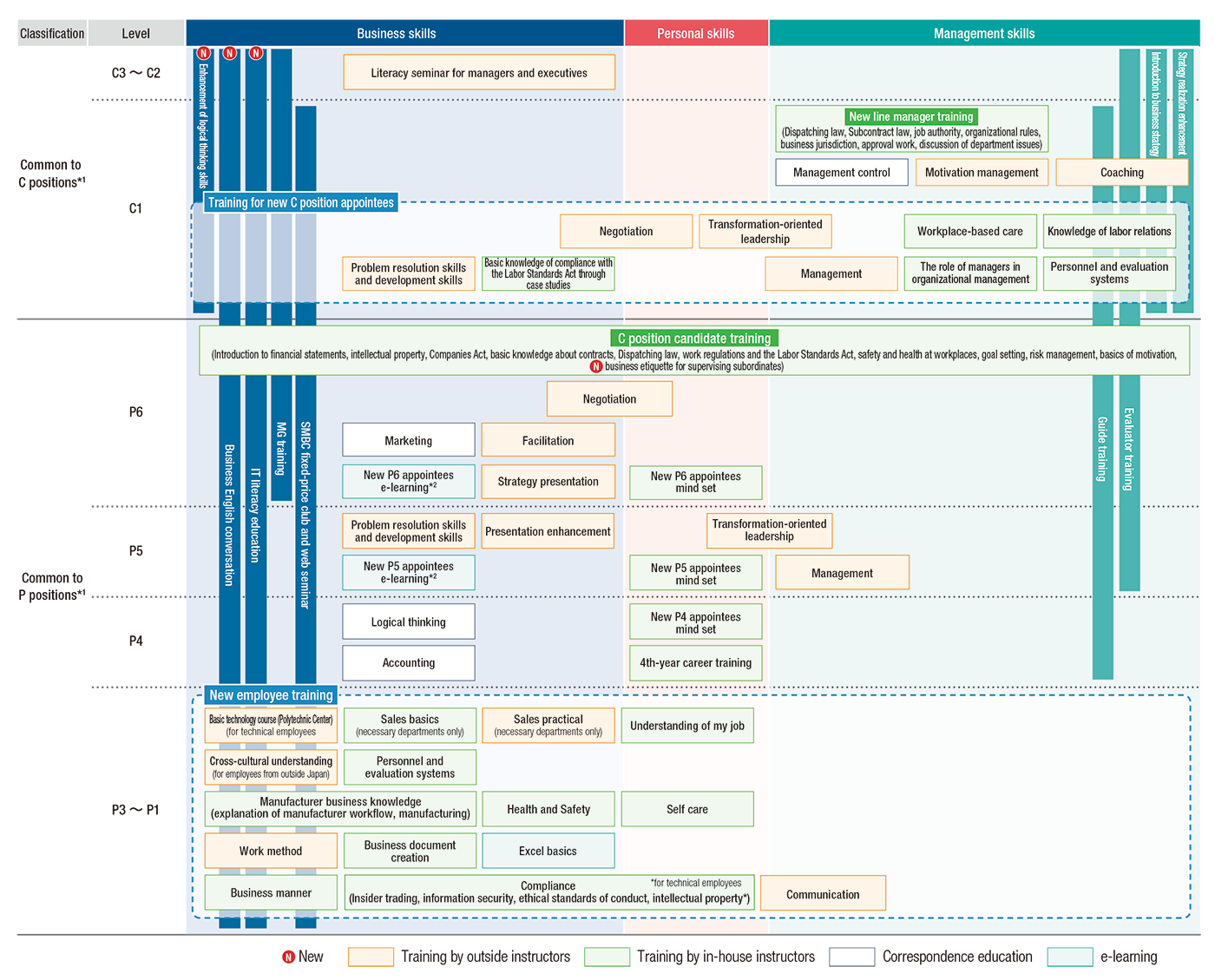
*1 C positions: Creative positions (managerial positions); P positions: Professional positions (general positions
*2 e-learning courses for new P5 and P6 positions: Labor Standards Act and work regulations, Industrial Safety and Health Act and Industrial Safety and Health Management Regulations, Dispatching law and
temporary work management, Introduction to financial statements, laws related to companies, basic knowledge of contracts, basic transaction agreements, confidentiality agreements, protection and collection of
debt, liability for non-compliance with contracts, product liability, overseas bases and international taxation, basic knowledge of English contracts, contract management regulations, insider trading, prevention of
bribery of foreign public officials (if taken at P5, exempt at P6)
*In addition to the above, we hold "Training Session for Mid-career Hires" four times a year (explaining about TOKYO KEIKI and its Group companies, product manufacturing processes, insider information management, information security, the Code of Ethical Conduct, occupational health and safety, etc.).
Education and training to enhance the value of human assets
To enhance the value of our human capital, we offer education and training to all employees, from new
entrants to executives. Specific examples include hierarchical education in the form of level-specific training
for the acquisition of knowledge and skill based on a finely-tuned curriculum.
This includes providing training to employees who have been promoted to managerial positions in the
Group to improve their skills in transformation-oriented leadership, management, problem resolution skills and
development skills, and negotiation in order to support the development of their capabilities. In principle, all employees
who have been promoted to managerial positions since the introduction of this training system are required to
participate in the training. However, some employees were unable to participate for work-related reasons, and as of March 31, 2025, the participation rate was 92.1% of eligible employees.
In addition, all employees promoted to management positions have an opportunity, six months after their
appointment, to report to the Representative Director, President & CEO on their progress in realizing the TOKYO
KEIKI Vision 2030 and receive feedback on their efforts.
Approach and Policy Regarding the Working Environment
In order to continue to foster a corporate culture in which a diverse range of
workforce can demonstrate their individual strengths and grow through taking
on challenges, the TOKYO KEIKI Group strives to create an environment
conducive to personal development by assigning the right people to the right
positions. In addition, we will work to establish a working environment that
accommodates a diverse workforce and a variety of work styles.
-
Promote a challenge-oriented personnel system to realize the TOKYO KEIKI
Vision 2030
-
Maximize the use of human capital by identifying individual capabilities
and placing the right people in the right positions.
-
Strive to create a comfortable working environment for everyone regardless
of gender, nationality, age, employment status, disability status, etc.
and to ensure that everyone has the opportunity to take on challenges.
-
Accommodate a diverse range of work styles and strive to achieve work–life
balance.
-
Aim for fair and equitable evaluations that lead to human resource
development.
-
Strive to maintain and improve a safe and secure work environment to
ensure both mental and physical health.
Reform of the personnel system to realize the TOKYO KEIKI Vision 2030
In order to realize TOKYO KEIKI Vision 2030, in fiscal 2022 we revised our
evaluation system and wage system. The concept behind the new personnel system
is to develop the company by placing human resource development at the core
and expanding it to "strengthening the ability to implement strategies,"
"employee growth," and "fostering a culture of taking on challenges," all of
which are interlinked and mutually reinforcing.
We believe that growth comes
from employees taking on challenges, learning from their mistakes, and
experiencing success. Accordingly, we have introduced the "Challenge Goal
System," which is designed to place high value on personnel who take on the
challenge of achieving ambitious goals. By reflecting evaluation results in
compensation and promotion, this system encourages employees to take on
challenges. Furthermore, beginning in fiscal 2025, we have revised the wage system for managers by reducing seniority-based elements and increasing the role-based pay ratio, thereby achieving a system to more appropriately reward highly contributing employees.
We will support our employees for their challenges, aiming for the development of the company and the realization of
the management targets set forth in TOKYO KEIKI Vision 2030. In addition, a committee has been established
to deliberate on evaluation results and issues related to the operation of the evaluation system, aiming for a fair,
equitable, and transparent personnel evaluation system.
Accommodating a diverse range of work styles
To let all employees fully exert their capabilities, we have implemented a number of measures, including the
establishment of various systems such as telework and flextime that can flexibly accommodate a variety of work
styles, as well as no-overtime days. In addition, to achieve work-life balance, we are striving to reduce overtime hours
and improve the rate at which employees take annual paid leave (annual leave). The upper limit on the number of times
employees can take half-day leave was eliminated in fiscal 2022, creating an environment that makes it easier for
employees to take annual leave. As part of our efforts to support our employees in balancing their work with childcare and nursing care, we have expanded the scope of eligibility for child nursing leave, reduced working hours for childcare, and placed restrictions on overtime to cover children up to elementary school graduation age, and have also put in place systems that exceed legal requirements, such as allowing a leave of absence for nursing care of up to one year, in order to promote diverse work styles.
Annual leave utilization rate
* C positions: Creative positions (managerial positions);
P positions: Professional positions (general positions)
* Aggregated for each year from October 1 to September 30 of the following
year.
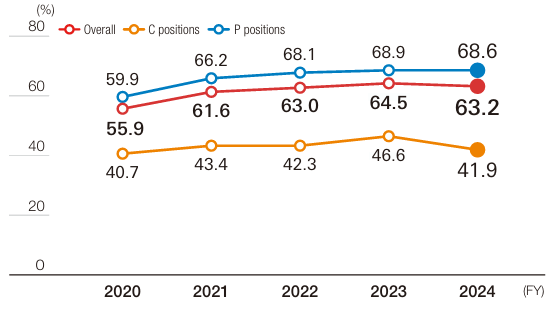
Promotion of women's active participation
By promoting the development of a comfortable working environment for women, including the establishment of a
childcare and nursing care leave system and a shortened working hours system for childcare, the TOKYO KEIKI Group
has maintained a 100% rate of eligible female employees taking childcare leave and returning to work after childcare
leave in fiscal 2024. Following the previous fiscal year, a woman was appointed to a managerial position at a plant, and other
opportunities for women to play an active role are expanding.
Number of female in management positions
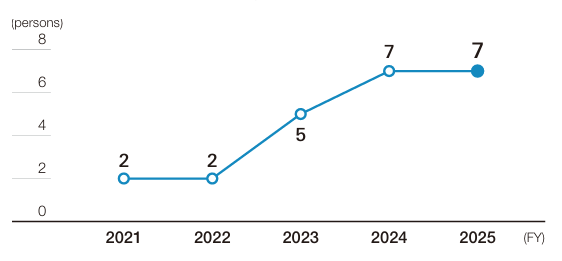
*Number at beginning of period
Promotion of men taking childcare leave
The TOKYO KEIKI Group also promotes the utilization of our childcare leave system by men in order to support
balance between work and childcare.
In fiscal 2024, 69.5% of eligible male employees took childcare leave, a figure achieved by ensuring sure everyone is aware of the system.
Rate of eligible male employees taking childcare leave
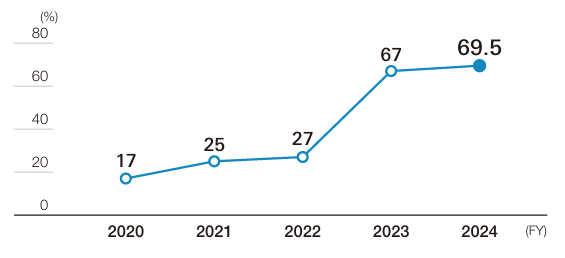
Employment of persons with disabilities
In addition to hiring at our head office and plants, we also use a satellite office that has been established as an
environment that makes it easy for people with disabilities to work, and strive for actively hiring people with disabilities
and expanding the scope of their work. In addition, in June 2024, we established a new collective workplace for
people with disabilities at our head office by utilizing the knowledge we have gained from our satellite offices.
In addition, the Nasu and Sano plants have installed ramps and other accessibility facilities to provide a safe and
secure working environment for people with disabilities.
Initiatives for employment of persons with disabilities
| FY
|
Major initiatives
|
| FY2020 |
Establishment of a satellite office specializing in employment of people with disabilities |
FY2022
|
Increase employees in satellite offices |
| The Sano Plant hires first person with intellectual disabilities |
FY2023
|
Increase employees in satellite offices |
| The Nasu and Sano plants have installed ramps and other accessibility facilities |
| FY2024 |
Establishment of a new collective workplace specializing for people with
disabilities and recruitment of such people at the head office
|
Special annual leave program
The TOKYO KEIKI Group has introduced a special annual leave program that allows employees to accumulate
expired annual leave and use it in such situations as medical treatment for personal injury or illness (including
infectious diseases), childcare, nursing care, or volunteer work. In fiscal 2023, the system was expanded to
allow use for follow-up examinations as part of health checkups. This system supports employees in their health
and balance between work and childcare or nursing care needs, as well as in performing community service, and is
used by a large number of employees each year.
Number of persons taking special annual leave
*Special annual leave refers to leave days newly granted on October 1 in number equal to days of annual paid leave that had expired in the previous
year. Persons who have used at least one day of the year during the fiscal year are counted.
*The number of users increased in FY2021-2022 in relation to COVID-19, but decreased in FY2023 due to downgrading COVID-19 to a Class V.
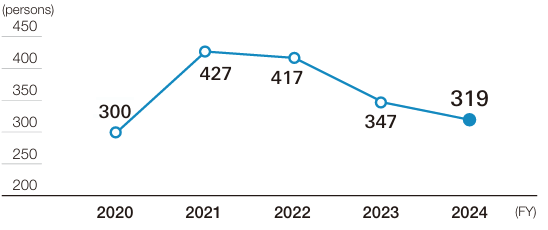
Initiatives to prevent harassment
The Group creates workplace environments in which all employees can exert
their capabilities to the utmost and pursue their potential. At the same time,
to achieve pleasant workplaces where people can actively collaborate and
cooperate with others, we seek to take measures to prevent and eliminate
harassment in workplaces and to respond promptly and fairly to complaints and
requests for consultations concerning harassment.
The Harassment Prevention
Regulations, which define harassment and prohibited actions, apply not only to
all officers and employees working for the Group, but also to customers,
business partners, and others. We have set up shared consultation desks, both
inside and outside the Company, to accept information from persons who have
been subjected to harm, from persons who have witnessed or heard of incidents
of harassment, or from other third parties who experience suspicions.
In the
event that a complaint is received, the Harassment Prevention Committee will
certify whether or not harassment has occurred after seeking the opinions of
lawyers and other experts. Following that, the Committee will report to the
Management Conference (in the case of a subsidiary, to the subsidiary’s Board
of Directors as well) and to the Board of Directors of Headquarters and the
Disciplinary Committee as necessary, and will entrust consideration of
disposition. The Harassment Prevention Committee will then consider and
implement measures for correction and prevention of recurrence, after which
the Committee, the head of the relevant department, and management supervisors
will prepare a harassment correction report.
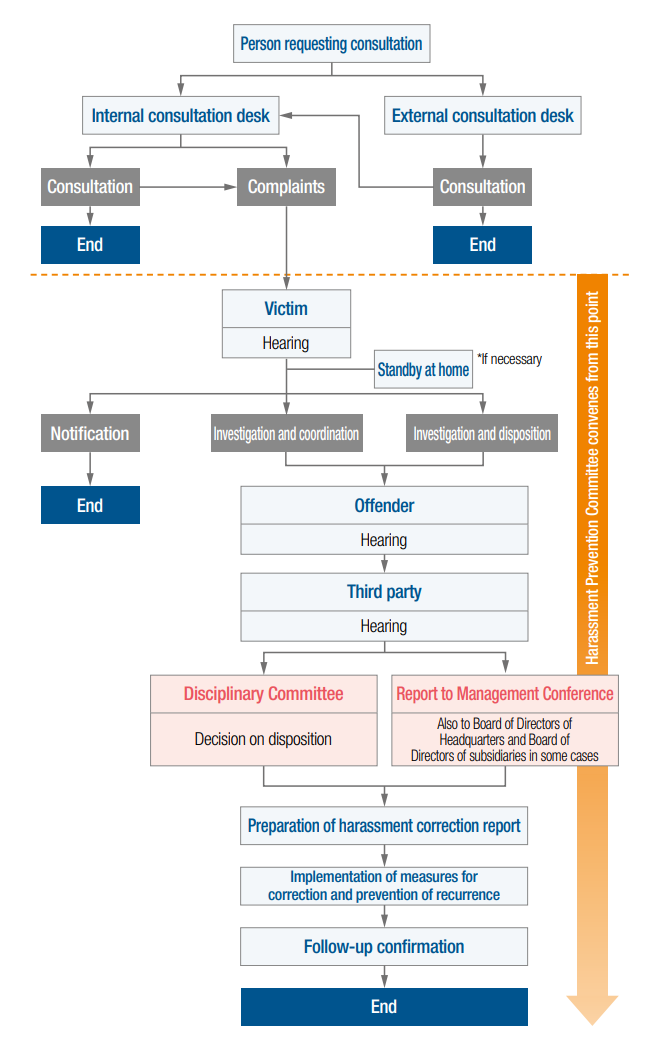
Health and productivity management initiatives
Since our founding in 1896, TOKYO KEIKI has been a pioneer in health management, addressing the mental
and physical health of every employee. To further promote health and productivity management, we established the Health and Productivity Management Promotion Council in fiscal 2023, issued the Health and Productivity Management Declaration both internally and externally in April 2024. As a result of having advanced various health-related initiatives, we were certified as a Health and Productivity Management Outstanding Organization (Large Enterprise Category) in fiscal 2025.
Health management at TOKYO KEIKI aims to ensure that our employees, who are our greatest asset, and the
family members that support them lead happy and secure lives so that the Company continues to grow sustainably.
For TOKYO KEIKI, managing employees' mental and physical health is a management issue. As such, we take
measures to eliminate risks, such as reducing absenteeism (where employees must take time off due to illness or
injury) and presenteeism (where they continue to work without taking time off, even though they are unable to
exercise their full potential due to poor physical condition or other reasons). We have introduced several welfare
measures to help employees feel safe, secure, and happy day to day. Our four priority measures are (1) overwork
countermeasure, (2) health management, (3) exercise habits, and (4) occupational health and safety.

Every month, we check the working hours of all employees. If an employee has worked many overtime hours, the
Committee for the Study of Working Hours Problems, consisting of labor and management, confirms the facts,
investigates why it occurred, and decides on measures to reduce the number of overtime hours. In addition, health
checkups and interviews with an occupational physician are conducted and labor and management confirm whether there are physical or mental health problems.
Average overtime hours
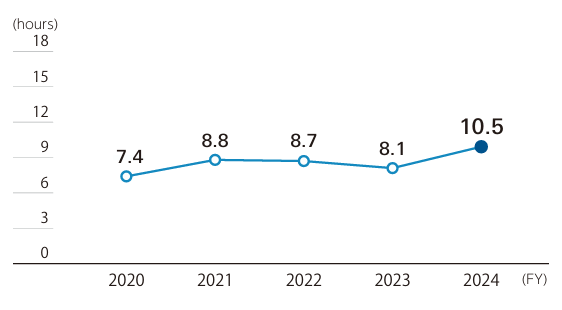
We are working to curb presenteeism by recommending follow-up examinations, depending on the stage, to
employees with abnormal findings in health checkups.
The Group conducts an annual vaccination program at workplaces to provide collective immunity against
seasonal influenza and other infectious diseases. Other measures to prevent the spread of infectious diseases
include making sure that workplaces always have disinfecting alcohol on hand. Some urgent events, such
as COVID-19, require a Group-wide approach. In such cases, we establish an Emergency Response Task
Force that collaborates with occupational physicians and occupational health nurses to determine the most
appropriate infection control measures based on the latest information. Controls are implemented over the
entire Group to prevent the spread of infection.
For mental health, we provide training for self-care and for workplace-based care through occupational
health nurses and Human Resources and General Affairs Department staff in charge of health care. We
also conduct stress checks for employees and provide feedback on the results.
In fiscal 2024, we conducted stress checks for 2,067 persons, with a response rate of 96.2% (1,989 persons analyzed).
As moderate exercise provides many health benefits, we offer events that staff can easily participate in. We hold two company-organized walking events each year, in addition to one organized by our health insurance association, providing three opportunities annually as part of our company-wide health initiatives. Family members may also participate in the health insurance association’s events. We also hold baseball tournaments with teams
from five bases including Head Office and the Group plants to enhance communication among them. Further, we
support the establishment of clubs and support them with subsidies.
Manufacturing involves many hazards, such as machinery, chemicals, and heavy objects. This makes ensuring
employee safety essential for continued operations. At the TOKYO KEIKI Group, we will strive to create and maintain
workplaces where employees can work safely and with peace of mind, and will continuously work to create environments in which accidents do not happen.
Health and Safety Policy
-
We will eliminate risk factors related to occupational health and safety
in the workplace, strive to create comfortable workplaces, and promote the
maintenance and improvement of physical and mental health.
-
We will build a health and safety management system that includes
occupational health and safety policies, and will maintain its
appropriateness, validity, and effectiveness by making continuous
improvements.
-
We will make occupational health and safety policies and other necessary
matters known to all persons who work at the Company, and will work to
enhance awareness of health and safety.
-
We will comply with laws and regulations related to occupational health
and safety management systems, with agreements concluded by the Company,
and with matters set forth in internal rules.
Work-related accidents in fiscal 2024 and efforts to prevent recurrence
Looking at work-related accidents in fiscal 2024, industrial accidents increased by 2 incidents from the previous fiscal year to 14 incidents and commuting related accidents increased by 6 incidents to 8.
When an industrial accident occurs, members of the district Health and Safety Committee conduct an on-site
inspection in the presence of the victim and determine measures to prevent recurrence. The content of these
measures is recorded in a work-related accident incident report and submitted to the Company-wide Health and
Safety Secretariat Liaison Conference. The measures are also horizontally deployed to the district Health and Safety Committees.
In recent years, such accidents have tended to be less the result of negligence due to familiarity by experienced
employees and more caused by inexperienced employees. Accordingly, we are striving to prevent industrial accidents before they occur by reinforcing instruction provided by
experienced workers during the period when inexperienced employees are acquiring the basics of safe operation. We
are also taking steps to further improve the workplace environment, for example by keeping workplaces tidy and
eliminating steps, as the number of accidents involving falls by older workers has been increasing.
As commuting-related accidents had increased significantly, in fiscal 2024, we provided traffic safety education to all drivers who had caused accidents more than once and are working to prevent traffic accidents through this and other initiatives.
| Category |
FY2024 results
|
FY2025 plan
|
| Recruitment |
• Recruitment based on business-unit plans
New graduate hires (joining in FY2025): 50
(37 men, 13 women, including 5 employees from outside
of Japan, 9 semi-recent new graduates)
Mid-career hires (joining in FY2024): 38
(32 men, 6 women, including 0 employee from outside of Japan)
|
• Expansion of recruitment quota for international
students and overseas students
• Expansion of recruitment quota for semi-recent
new graduates
• Establishment of internship courses
|
| Human resource development |
• Implemented 49 level-specific training programs (49 in
FY2023)
• Implementation of dialogue with the President (for newly
appointed managers)
• Expansion of recognized public qualifications
• Manager training programs, including a new course on
"Strategy conception skills" and "Logical Thinking Skills,"
to support the achievement of TOKYO KEIKI Vision 2030
• A new training program for developing young engineers
• A new IT literacy training program (e-learning)
|
• Implementation of a reskilling program
• Initial setup of a talent management system
|
| Human resources system |
• Revision of wage system for management-level employees
(to be revised from fiscal 2025)
• Revision of retirement allowance system and adoption of
optional defined contribution (DC) plan (to be revised and
introduced from fiscal 2025)
|
• Review of the re-employed system for retirees
|
| Diversity |
• Surveys of female employees for promoting women's
active participation
• Rate of eligible male employees taking childcare leave:
69.5%
• Established a new collective workplace specialized for
people with disabilities and recruited such people at the head office
|
• Improvement of the employment environment and
implementation of mechanisms that enable women to fully demonstrate their capabilities, promoting their participation and advancement
• Stable employment system for people with
disabilities outside of the head office (plants, external contractors, etc.) to be established and operated
|
| Health and productivity management |
• Regular meetings of the Health and Productivity
Management Promotion Council
• Recommendation of follow-up examinations for employees
with abnormal findings; work restriction imposition for employees exceeding certain levels
• Granting of special leave for follow-up examinations based
on the results of health checkups (permission to use)
• Implementation of occupational physician interviews for
long-hour employees
• Workplace vaccinations against influenza
• Launch and opening of a dedicated health management
website for internal and external use
• Walking events (at least twice a year)
• E-learning on diet, smoking, and female-specific health
issues
• Maintained 100% record of health checkup rate, and
implemented other health checkup measures
• Implementation of measures to increase the annual leave
utilization ratio
• Obtaining certification as a "Health and Productivity
Management Outstanding Organization"
|
• Introduction an APP to improve employee's dietary
habits
• Internal and external disclosure of the Health and
Productivity Management Strategy Map
• Continued implementation of other initiatives
conducted in fiscal 2024
|